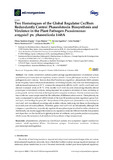Mostrar el registro sencillo del ítem
Two homologues of the global regulator Csr/Rsm redundantly control phaseolotoxin biosynthesis and virulence in the plant pathogen Pseudomonas amygdali pv. phaseolicola 1448A
| dc.creator | Ramírez Zapata, Diana | es_ES |
| dc.creator | Ramos, Cayo | es_ES |
| dc.creator | Aguilera, Selene | es_ES |
| dc.creator | Bardají Goikoetxea, Leire | es_ES |
| dc.creator | Martínez Gil, Marta | es_ES |
| dc.creator | Murillo Martínez, Jesús | es_ES |
| dc.date.accessioned | 2020-10-06T14:46:34Z | |
| dc.date.available | 2020-10-06T14:46:34Z | |
| dc.date.issued | 2020 | |
| dc.identifier.uri | https://hdl.handle.net/2454/38352 | |
| dc.description.abstract | The widely conserved Csr/Rsm (carbon storage regulator/repressor of stationary-phase metabolites) post-transcriptional regulatory system controls diverse phenotypes involved in bacterial pathogenicity and virulence. Here we show that Pseudomonas amygdali pv. phaseolicola 1448A contains seven rsm genes, four of which are chromosomal. In RNAseq analyses, only rsmE was thermoregulated, with increased expression at 18 °C, whereas the antagonistic sRNAs rsmX1, rsmX4, rsmX5 and rsmZ showed increased levels at 28 °C. Only double rsmA-rsmE mutants showed significantly altered phenotypes in functional analyses, being impaired for symptom elicitation in bean, including in planta growth, and for induction of the hypersensitive response in tobacco. Double mutants were also non-motile and were compromised for the utilization of different carbon sources. These phenotypes were accompanied by reduced mRNA levels of the type III secretion system regulatory genes hrpL and hrpA, and the flagellin gene, fliC. Biosynthesis of the phytotoxin phaseolotoxin by mutants in rsmA and rsmE was delayed, occurring only in older cultures, indicating that these rsm homologues act as inductors of toxin synthesis. Therefore, genes rsmA and rsmE act redundantly, although with a degree of specialization, to positively regulate diverse phenotypes involved in niche colonization. Additionally, our results suggest the existence of a regulatory molecule different from the Rsm proteins and dependent on the GacS/GacA (global activator of antibiotic and cyanide production) system, which causes the repression of phaseolotoxin biosynthesis at high temperatures. | en |
| dc.description.sponsorship | This work was funded by the Spanish Plan Nacional I+D+I grants AGL2017-82492-C2-1-R and AGL2017-82492-C2-2-R, from the Ministerio de Economía y Competitividad (MINECO), co-financed by the Fondo Europeo de Desarrollo Regional (FEDER). DR-Z was supported by a Formación de Personal Investigador (FPI) contract (reference BES-2015-074315, Ministerio de Economía y Competitividad, Spain). | en |
| dc.format.mimetype | application/pdf | en |
| dc.language.iso | eng | en |
| dc.publisher | MDPI | en |
| dc.relation.ispartof | Microorganisms 2020, 8, 1536 | en |
| dc.rights | © 2020 by the authors. Licensee MDPI, Basel, Switzerland. This article is an open access article distributed under the terms and conditions of the Creative Commons Attribution (CC BY) license. | en |
| dc.rights.uri | http://creativecommons.org/licenses/by/4.0/ | |
| dc.subject | Phaseolotoxin | en |
| dc.subject | Phytotoxins | en |
| dc.subject | GacS/GacA system | en |
| dc.subject | Two-component signal transduction system | en |
| dc.subject | Small regulatory RNAs | en |
| dc.subject | Post-transcriptional regulation | en |
| dc.subject | Virulence | en |
| dc.subject | Pseudomonas syringae | en |
| dc.subject | Pseudomonas savastanoi | en |
| dc.title | Two homologues of the global regulator Csr/Rsm redundantly control phaseolotoxin biosynthesis and virulence in the plant pathogen Pseudomonas amygdali pv. phaseolicola 1448A | en |
| dc.type | Artículo / Artikulua | es |
| dc.type | info:eu-repo/semantics/article | en |
| dc.contributor.department | Institute for Multidisciplinary Research in Applied Biology - IMAB | es_ES |
| dc.rights.accessRights | Acceso abierto / Sarbide irekia | es |
| dc.rights.accessRights | info:eu-repo/semantics/openAccess | en |
| dc.identifier.doi | 10.3390/microorganisms8101536 | |
| dc.relation.projectID | info:eu-repo/grantAgreement/AEI/Plan Estatal de Investigación Científica y Técnica y de Innovación 2013-2016/AGL2017-82492-C2-2-R/ES/ | en |
| dc.relation.publisherversion | https://doi.org/10.3390/microorganisms8101536 | |
| dc.type.version | Versión publicada / Argitaratu den bertsioa | es |
| dc.type.version | info:eu-repo/semantics/publishedVersion | en |



